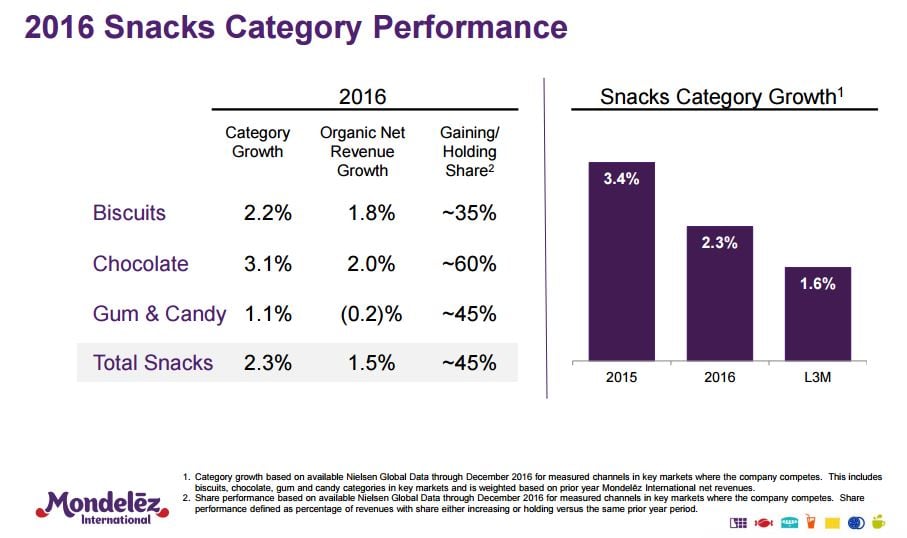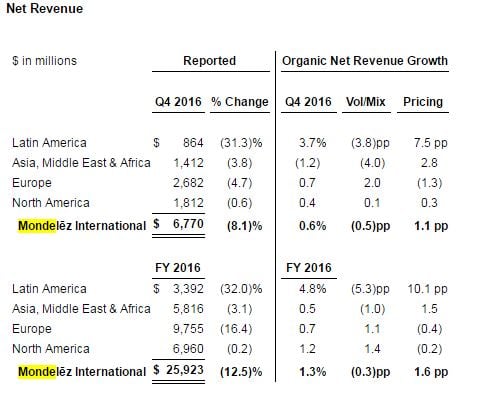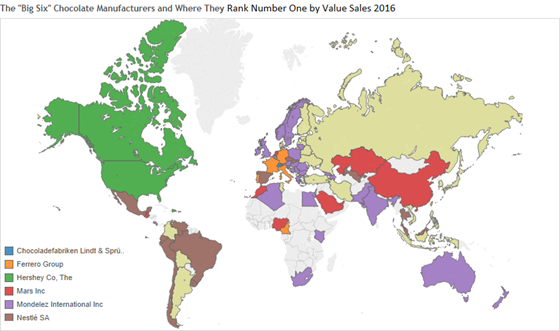Global trading firm SIG had long considered Mondelēz a “logical fit” as Kraft's next acquisition target, but has now softened its stance.
Mondelēz yesterday posted a full-year 2016 reported net revenue decline of 12.5% and organic net revenue growth of 1.3%.
The company had forecast at least 2% organic net revenue growth for 2016 in February last year.
Brexit, India demonetization and political environment
Mondelēz’s chairman and CEO Irene Rosenfeld cited lower GDP growth, currency and commodity volatility, the Indian banknote demonetization,"the uncertain impact of the Brexit vote", "complex developments in the political landscape" and "a backlash against globalization" during the company's earnings call.
"The impacts from these events are being felt across many companies and industries, and we're not immune."
Mondelēz’s fourth quarter (Q4) reported net revenues were down 8.1%, while organic net revenues grew 1.3% during the quarter.
Rosenfeld said: "While we're encouraged by our results in 2016, we acknowledge that our top line is not yet where we want it to be."

Net profit slumps 77%
The company's gross profit declined 12% to $10.1bn for the full-year 2016, while net earnings dropped 77.2% to $1.7bn.
Mondelēz grew at a slower rate to the overall market in every operating category. Full-year 2016 organic net revenues in biscuits were up 1.8%, the chocolate segment grew 2%, while gum and candy decreased by 0.2%.

But Rosenfeld said the company was well-positioned for future growth.
Mondelēz expects organic net revenues to increase at least 1% in 2017 and a double-digit adjusted EPS growth on a constant-currency basis.
Power brands to major markets
Rosenfeld said the company was filling white spaces by bringing its power brands to major markets.
Mondelēz recently brought its Milka brand to the US and China. It has also rolled out premium chocolate brand Green & Blacks in the US, as well as recently extending the brand into brownie category with Milka in Europe.
The company has also taken back its Nabisco licenses in the Japanese market, where products such as Oreos and Ritz were previously produced by Yamazaki Baking
Rosenfeld also highlighted the company's e-commerce business, which grew reported net revenues by more than 35% in 2016 after the company invested in a dedicated online team. Mondelēz is targeting at least $1bn in e-commerce revenues by 2020.
The company was also strong in Latin America in 2016 with 3.7% organic net revenue growth led by Mexico and Argentina.
But CFO Brian Gladden said: "Brazil remains a challenging market. Government austerity, tight credit conditions, and high unemployment continued to temper consumption, causing consumers to trade down to lower-priced snacking options."
Difficulties of driving margin expansion in North America and Europe
SIG analysts were surprised Mondelēz’s stock shows “no impact from ‘Trump risk’ (taxes on US bound products from plants in Mexico like Salinas and the inflationary pressures for the sizable UK business post Brexit, given the weaker GBP).”
“While we keep our positive stance [on Mondelēz being acquired by Kraft], we see some near term downside risks,” SIG said.
However, SIG added the Trump impact and Brexit may affect the company’s ability to drive margin expansion in 2017 in North America and Europe.
“By the same token, continued currency weakness in emerging markets [such as China] may limit the company’s room to drive higher margins there.”
Mondelēz posted reported net sales declines of 4.7% and 0.6% respectively in Europe and North America in Q4.
Looking at Australasia, Middle East, Africa and Asia Pacific for opportunities
Euromonitor food analyst Jack Skelly said chocolate confectionery makes up 58% of Mondelēz’s total confectionery sales, and 32% of the company’s total packaged food sales.

“It is also outperforming the company’s overall packaged food sales, thanks to continuing success in emerging markets, such as India, and the launch of a number of successful new products in Australia and UK,” he said. “Over one third of Mondelēz’s confectionery sales come from Western Europe.”
“As the largest market for chocolate confectionery globally, Western Europe remains Mondelēz’s powerhouse. However, it should look towards Australasia, the Middle East and Africa and Asia Pacific for stronger growth opportunities.”
In addition to bringing Milka as a premium chocolate brand to China, Mondelēz has also partnered with China’s online retail platform, Alibaba to support its 2020 e-commerce goal.
